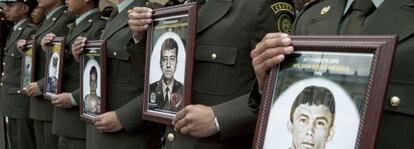Workers freed as FARC pledges to end all kidnappings
Former senator says guerrillas may release 10 army and police officers at end of month

The Colombian government said that nine people who had been kidnapped by an unknown group while working on an oil pipeline in eastern Arauca department were released on Wednesday.
Defense Minister Juan Carlos Pinzón said it wasn't clear if the seven workers and two truck drivers were taken by the Revolutionary Armed Forces of Colombia (FARC), but explained that they were released after being held for 24 hours because of "public pressure."
Both the FARC and the National Liberation Army (ELN), another guerrilla group, are active in Arauca, which borders Venezuela.
In a surprise announcement, the FARC said on Sunday that it was ending its decades-long "kidnapping campaign," and would free 10 army and police officers held in captivity as a sign of its good faith in eventually negotiating a peace accord with the government of President Juan Manuel Santos.
The FARC has not given a precise number of how many people it is still holding but some NGOs believe the number of kidnapped victims stands between 400 and 650.
The leftist former Senator Piedad Córdoba, who has contacts with some FARC members, said the guerrilla group could start releasing army and police officers who have been held for more than a decade within a month.
The NGO Colombians for Peace (CCP) organization said it plans to send a letter to FARC leaders asking about the whereabouts of some 200 military officers who are still missing.
Tu suscripción se está usando en otro dispositivo
¿Quieres añadir otro usuario a tu suscripción?
Si continúas leyendo en este dispositivo, no se podrá leer en el otro.
FlechaTu suscripción se está usando en otro dispositivo y solo puedes acceder a EL PAÍS desde un dispositivo a la vez.
Si quieres compartir tu cuenta, cambia tu suscripción a la modalidad Premium, así podrás añadir otro usuario. Cada uno accederá con su propia cuenta de email, lo que os permitirá personalizar vuestra experiencia en EL PAÍS.
¿Tienes una suscripción de empresa? Accede aquí para contratar más cuentas.
En el caso de no saber quién está usando tu cuenta, te recomendamos cambiar tu contraseña aquí.
Si decides continuar compartiendo tu cuenta, este mensaje se mostrará en tu dispositivo y en el de la otra persona que está usando tu cuenta de forma indefinida, afectando a tu experiencia de lectura. Puedes consultar aquí los términos y condiciones de la suscripción digital.








































